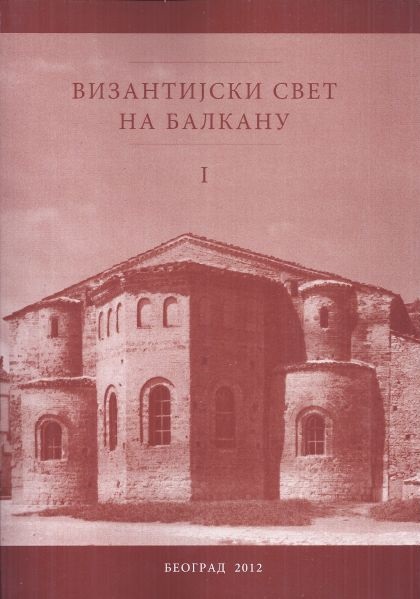Страх од Турака у писмима Димитрија Кидона (1352'-1371)
Fear of the Turks In The Letters Of Demetrios Cydones (1352–1371)
Author(s): Bojana Pavlović
Subject(s): Cultural history, Diplomatic history, 13th to 14th Centuries
Published by: Vizantološki institut SANU
Summary/Abstract: The letters of Demetrius Cydones, one of the greatest intellectuals of late Byzantium, represent a very valuable source for the history of the Empire. They have proven to be a real treasury of significant information which make our knowledge and understanding of the situation within the Byzantine Empire, as well as the issues of its foreign affairs, more complete and elaborate. Having occupied a very high position at the court of both John VI Kantakouzenos and John V Palaeologos, Cydones was able to participate in the politics of the Empire at a time of the great crisis his country was undergoing. Cydones witnessed the rise and fall of Kantakouzenos, the turbulent years of John V Palaeologos’ reign, and, most importantly, the failure of the Byzantine negotiations with the West of which he himself was a strong supporter.
As a witness of the turmoil Byzantium was facing in the 14th century, Cydones left very thorough accounts about the almost constant threats to the Empire caused by the Ottoman Turks. The fear and terror of an unknown future made the lives of Cydones and his countrymen hard and uncertain. Those, who, at the beginning of the 14th century were nothing but one of the many tribes on the eastern borders of the Empire of Constantine the Great, soon turned out to be very dangerous “allies” and fearsome conquerors of its territories.
The battle of Didymoteicho in 1352, of which we find the accounts in two of Cydones’ letters, is certainly one of the most important battles in the civil war between John VI Kantakouzenos and John V Palaeologos. The muslim “allies” of the elder emperor prevailed over the Serbian allies of Palaeologos. As it is known, this battle paved the way for the further penetration of the Ottomans into the Balkans, and opened the gates to the conquerors of the Balkan Peninsula. It is at this point that Cydones’ interest in the Turks and his almost constant appeals to the Byzantines and the Westerners to find a way for mutual actions against the “infidels” started.
In the letters Cydones’ wrote to his friends (John Laskaris Kalopheros, Georgios Synadenos Astras, John Kyparissiotes, Simon Atoumanos), we find numerous warnings that the gates of the Great City might soon become a prison for its inhabitants. Therefore, according to Cydones, a serious defense had to be undertaken with the help of the Westerners in the form of a crusade. The negotiations turned out to have led to small crusades of the Cypriot king, Peter I Lousignan, and Amadeo VI, the count of Savoy, but they brought no true relief to the Empire. The danger was becoming ever more serious and fear was spreading very fast. The great disappointment of the “Roman journey” 1369–1371, led to an even greater disillusionment after the battle at the Maritza. The bloody outcome of this decisive battle was, as we presume, recorded in one of the letters of Cydones’ correspondence.
The “Turkish threat” together with Cydones’ appeals to both the Byzantines and the Westerners for cooperation in the fight against the “infidels” is one of the central themes of Cydones’ correspondence. These letters reveal a man of action, an intellectual who, unlike most of his contemporaries who searched for eschatological explanations for the misfortunes that befell their country, tried to find realistic answers and a solution to the problem of the Turks. They provide us with an insight into the discrepancies between the three different worlds and uncover Cydones’ personal views on the foreign policy of Byzantium.
Book: Византијски свет на Балкану I-II
- Page Range: 373-383
- Page Count: 11
- Publication Year: 2012
- Language: Serbian
- Content File-PDF

